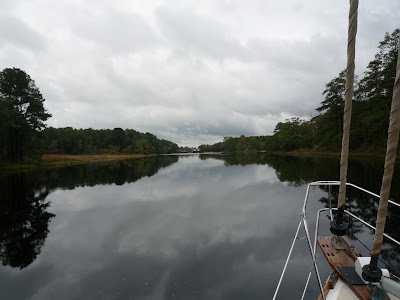Before we left Charleston, a young stranger approached the boat in the marina. He introduced himself and said that he was looking to crew on a sailboat going south. He had just come in from Virginia on a catamaran, but that boat had crew lined up for the next leg. Neither Evan nor I was inclined to invite a stranger to spend days and nights with us on the boat, helpful though it always is to have extra hands on deck. Apparently, this kind of arrangement is common enough, but we politely declined and set out on our second off-shore overnight trip.
Twenty-nine hours later, we'd motor-sailed 175 nautical miles (or 200 "statute" aka land miles) from Charleston, SC to Fernandina Beach, Amelia Island, FL.
It was perfect weather for motor-sailing: very light wind, calm water with the occasional swell from a distant weather system. Evan and I listened to the soft hiss of the boat's wake spreading out ripples of quick-dying froth across the sea. The sound resembled a snake's hissing, its flickering tasting and smelling exploration of something unidentifiable in the air. We sailed past blooms of mushroom jellyfish that really did look like baby portabellas.
We saw at least four or five dolphins too, a few of which surfaced so close to the boat out of the blue that I yelped. They didn't hang out much after that, even though I apologized for the rude welcome.
Along with terns and pelicans, we noticed a small bird fluttering in crazy swoops. It was clearly not a seafaring bird--it looked like a swallow, or some other bird that should be hanging out in bushes and shrubs, hopping around on the ground for seeds or something. We worried that the poor thing was somehow lost and would just wear itself out if it didn't find someplace to land. It flew close to the boat a few times but didn't land, and we eventually outpaced it.
Lo and behold, not long before sunset, almost an hour after we first spotted it, the small swallow-like bird landed on the stern rail! Then it hopped onto the covered fender, which was easier to keep hold of than the slippery metal rail.
It explored that section of the cockpit before taking off in a mad flutter behind the boat, up into the sky, and then back onto the boat! This happened over and over again, each time its stay on the boat a little longer than the last. Finally, the bird hopped over to Evan and me and onto our feet, our knees, our arms. Even though it weighed no more than a couple of ounces, I could feel its weight where it perched on me. It flew away again.
Next time, it walked around us like we'd known each other since land--"hey, got anything to eat?"--and hung out on the floor of the cockpit, pecking at whatever uncleaned mess dwelled down there and the fresh water we'd put out. Then, as the sun went down, Otto (we named him after the seventh visit or so) hopped into the cabin and, after checking out different areas a couple times, settled down next to a wadded-up fleece blanket on the settee, and, puffing his feathers, went to sleep.
He stayed asleep the whole night, even with our comings and goings and the constant crackle of the radio. At first light, while I was napping, Otto woke up and paid Evan a visit in the cockpit, did a couple of his usual swoops off and on the boat, then didn't come back. We missed him during the day and hoped that the rest he'd had would at least give him some juice for the six mile flight back to land. Later in the afternoon, we were glad to hear a woman on the radio announce that a yellow-breasted bird had come into her cabin. I hope it was Otto!
Besides the excitement of making friends with Otto (who, as internet research reveals, was probably a female
Carolina wren), Evan and I fell into a smooth rhythm for the night watch. Once the moon set a little bit before 9pm, we took turns standing watch, one person keeping an eye for other boats in the night, listening to the VHF radio, and monitoring the autopilot for deviations from our plotted course. We found it easy to stay awake during our turns at watch, easy to fall asleep when our turn was over, and easy to wake up on our own when it was time to switch. Thankfully, the night wasn't as cold as I'd feared, and I was warm and toasty in my layers. Also, my Kindle with its built-in cover light came in very handy for keeping me alert: every 5-7 minutes or so, I'd read a few pages, cover the light (to get back my night vision), scan the horizon, check the GPS, and resume reading, ears pricked for radio communication. It was fun.
Now we're on a mooring in Fernandina Beach, FL. The sun has just set, so I'm going to go to bed soon. My head feels like a cracked bronze bell that's been stuffed with wool and packed away in a dusty crate.













































